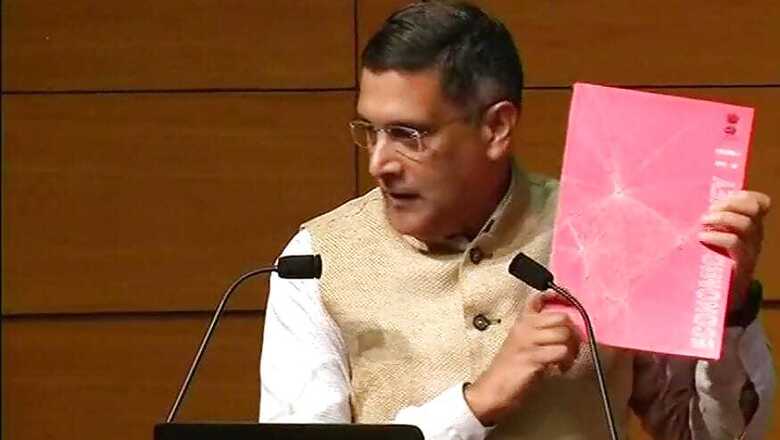
views
New Delhi: Arvind Subramanian has called it quits after four illustrious years at North Block. His tenure was marked by brave additions and far-sighted changes.
Subramanian took over the post on October 16, 2014 succeeding Raghuram Rajan. The post of CEA was lying vacant for over a year since Rajan left to join the Reserve Bank of India as governor in September 2013.
Subramanian’s term was for three years, which was to end on October 16, 2017. He had got an extension of one year in September 2017, his term was to end in October this year.
Fifty-nine-year-old Subramanian has brought about stark changes in the way the Economic Survey is drafted. The four surveys that he wrote were far lesser in terms of length than that of Shankar Acharya, Bimal Jalan, Ashok Lahiri or even Raghuram Rajan.
When he wrote the first chapters of his maiden Economic Survey 2014-15, Subramanian wrote, “As the new government presents its first full-year budget, a momentous opportunity awaits. India has reached a sweet spot—rare in the history of nations—in which it could finally be launched on a double-digit medium-term growth trajectory.”
The pompous yet retrospective tone continued through most of the operative segments. Borrowing Prime Minister Narendra Modi’s call of “wiping every tear from every eye”, Subramanian made a prescient remark: “The power of growth to lift all boats will depend critically on its employment creation potential.”
One senses that Subramanian was aware of the need for a detailed analysis on wide-ranging topics such as women, children, water and avenues which seldom found space in economic surveys before or even if they did, were far lesser in volume.
“The Twilight of the government’s current term is an appropriate juncture to step back and draw broader lessons for the Indian economy going forward,” the first few paragraphs of Economic Survey 2017-18 notes. He had made a candid admission that “recent macroeconomic developments are a reminder that the battle for macro-economic stability is never won, that even major victories are always provisional, and that vigilance is always needed”.
His experimental ideology peaked when he presented the economic survey last year with a pink cover, dedicating it to women.
Universal Basic Income which talks about ensuring minimal yet compulsory levels of earnings across population remains to be his most ambitious proposals.
Subramanian's elder brother is V S Krishnan who is a retired Indian Revenue Service officer and a former member of the Central Board of Excise and Customs and was a key player in piloting the Goods and Service Tax (GST) Bill.
Subramanian served as the Dennis Weatherstone Senior Fellow at the Peterson Institute for International Economics and a Senior Fellow at the Center for Global Development, both located in Washington DC. Formerly an economist at the International Monetary Fund, he is a widely cited expert on the economics of India, China, and the changing balance of global economic power.
Subramanian is the author of two books, India's Turn: Understanding the Economic Transformation published in 2008, Eclipse: Living in the Shadow of China's Economic Dominance published in September 2011, and co-author of Who Needs to Open the Capital Account? which was published in 2012.
Subramanian attended the DAV Boys Senior Secondary School, Chennai, for his high school education. He pursued a bachelors’ degree in economics from St Stephen's College, Delhi. He went on to earn an MBA from the Indian Institute of Management, Ahmedabad and MPhil and DPhil degrees from the University of Oxford on an Inlaks Scholarship.
Subramanian was the Assistant Director in the Research Department of the IMF. He is a development economist who worked closely with RBI Governor Raghuram Rajan when both were at the IMF. He served at the GATT during the Uruguay Round of trade negotiations. He has taught at Harvard University's Kennedy School of Government from 1999 to 2000. He has also taught at Johns Hopkins' School for Advanced International Studies from 2008 to 2010.
He contributes frequently to the Financial Times and is a columnist in financial daily, Business Standard.
Not many are aware that as a senior fellow, Peterson Institute for International Economics and Center for Global Development, in March 2013, Subramanian appeared before United States House Committee on Ways and Means hearing on “US-India trade relations.” During his testimony, Subramanian said “by discriminating against Indian companies and exporters, (US initiatives) will exert natural pressure on India to open up”.
The CEA is usually the go-to person for advice for the finance minister on macro-economic matters. His primary responsibilities, among others, include authoring the mid-year analysis and the Economic Survey which is presented to the Parliament a day before the Budget session.
The post of the CEA carries a three-year tenure, but the government had extended the tenure by one year for Subramanian. The office of CEA is considered one of the crucial government institutions that are important for monitoring performances of various key sectors.


















Comments
0 comment